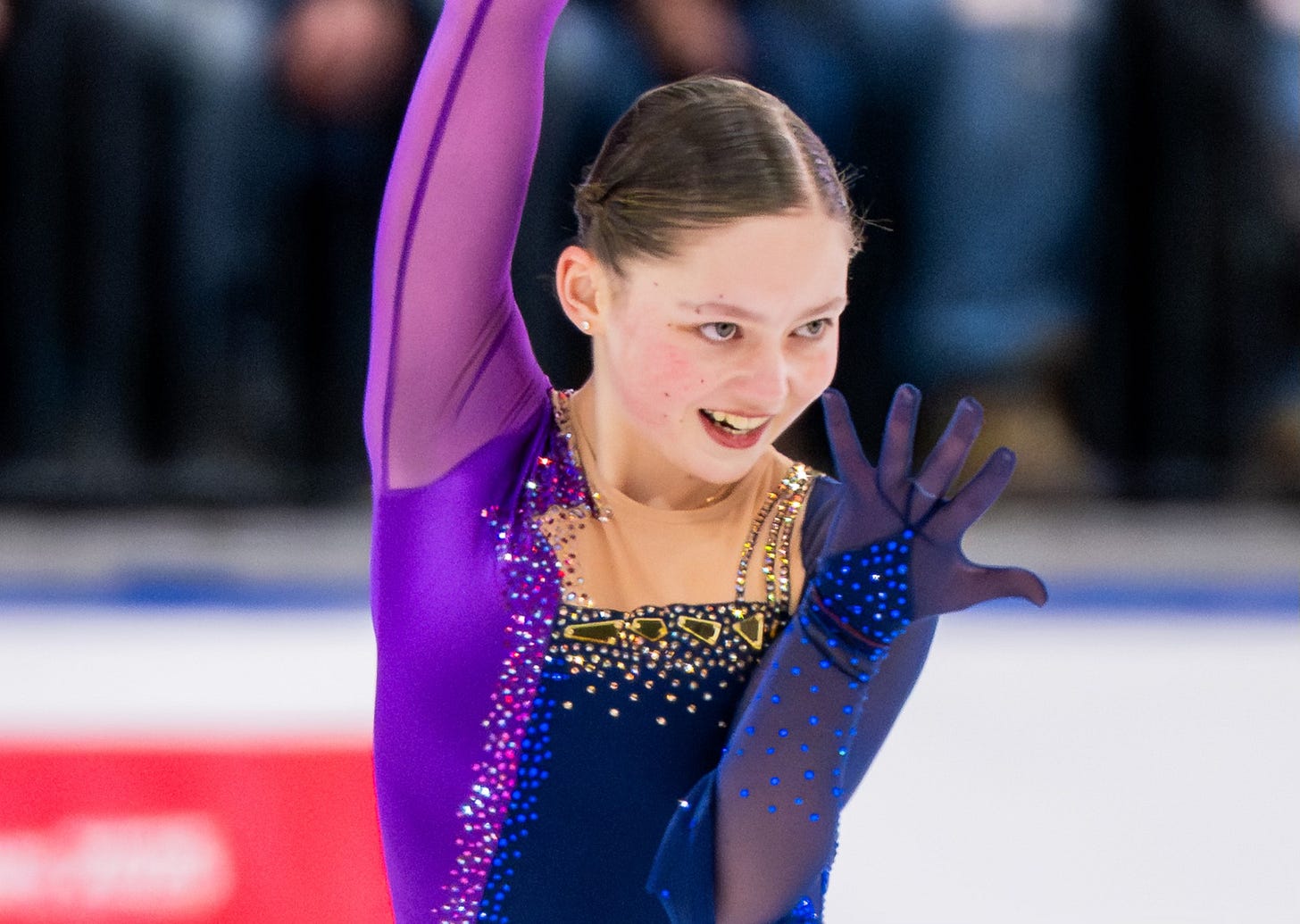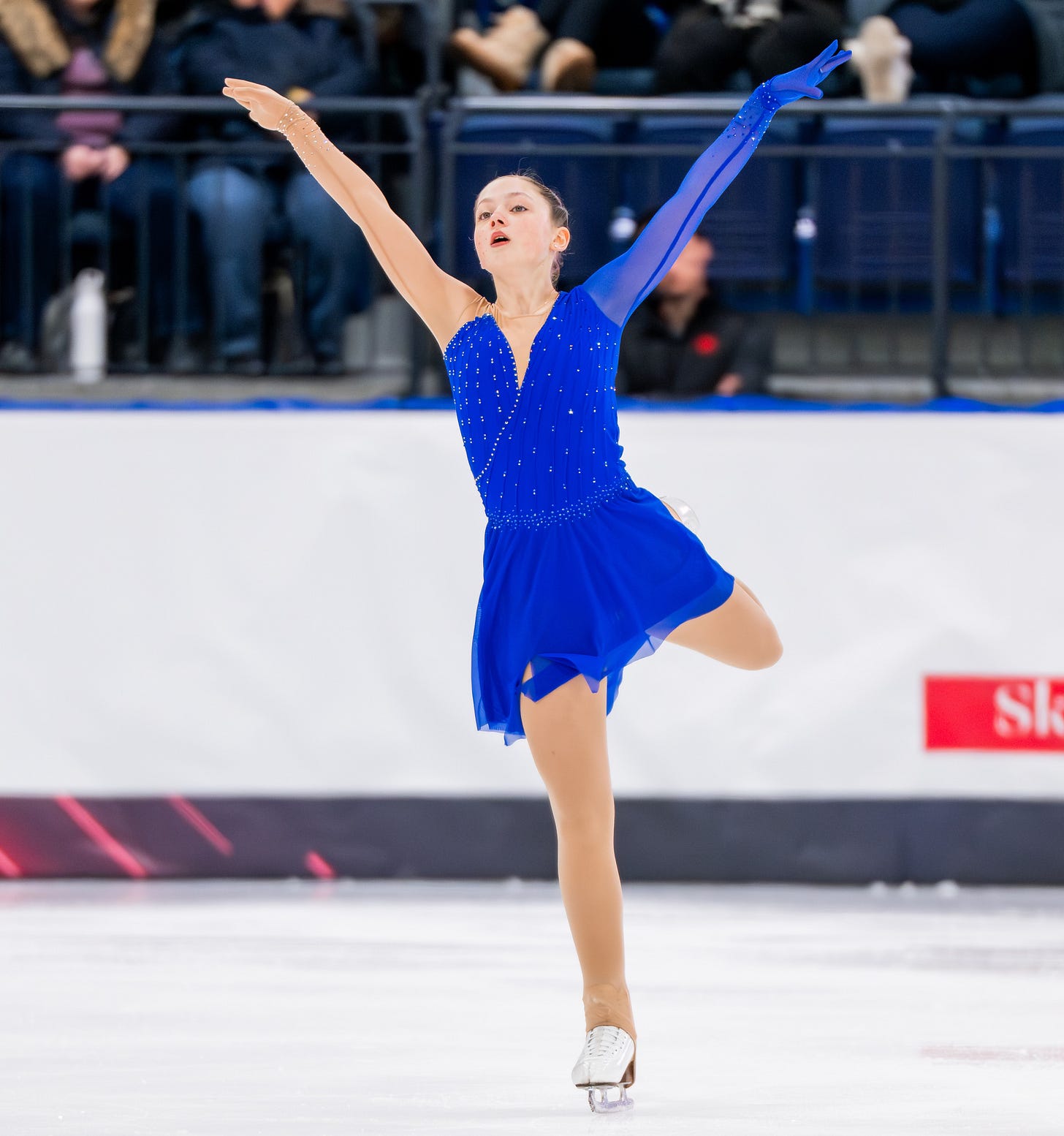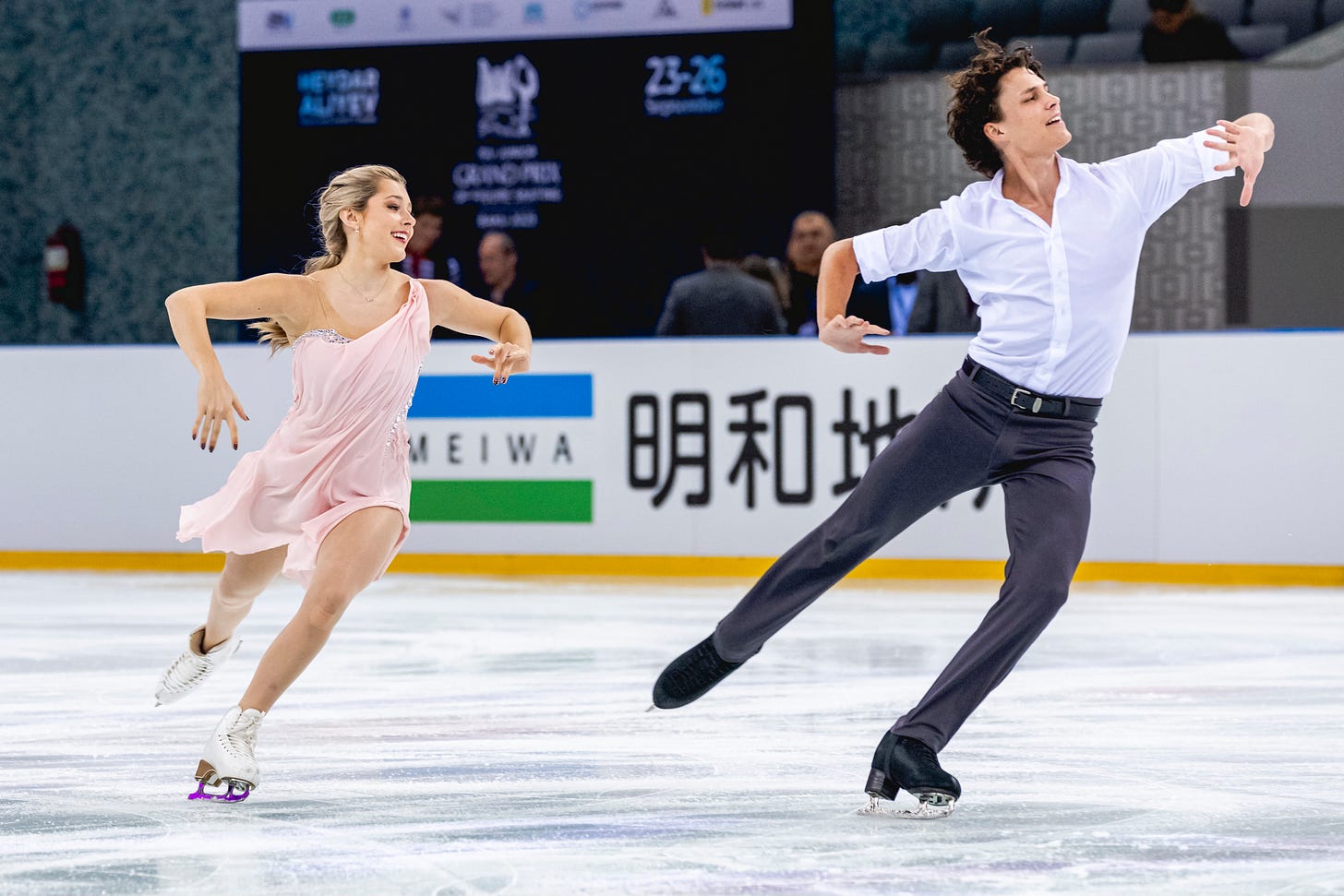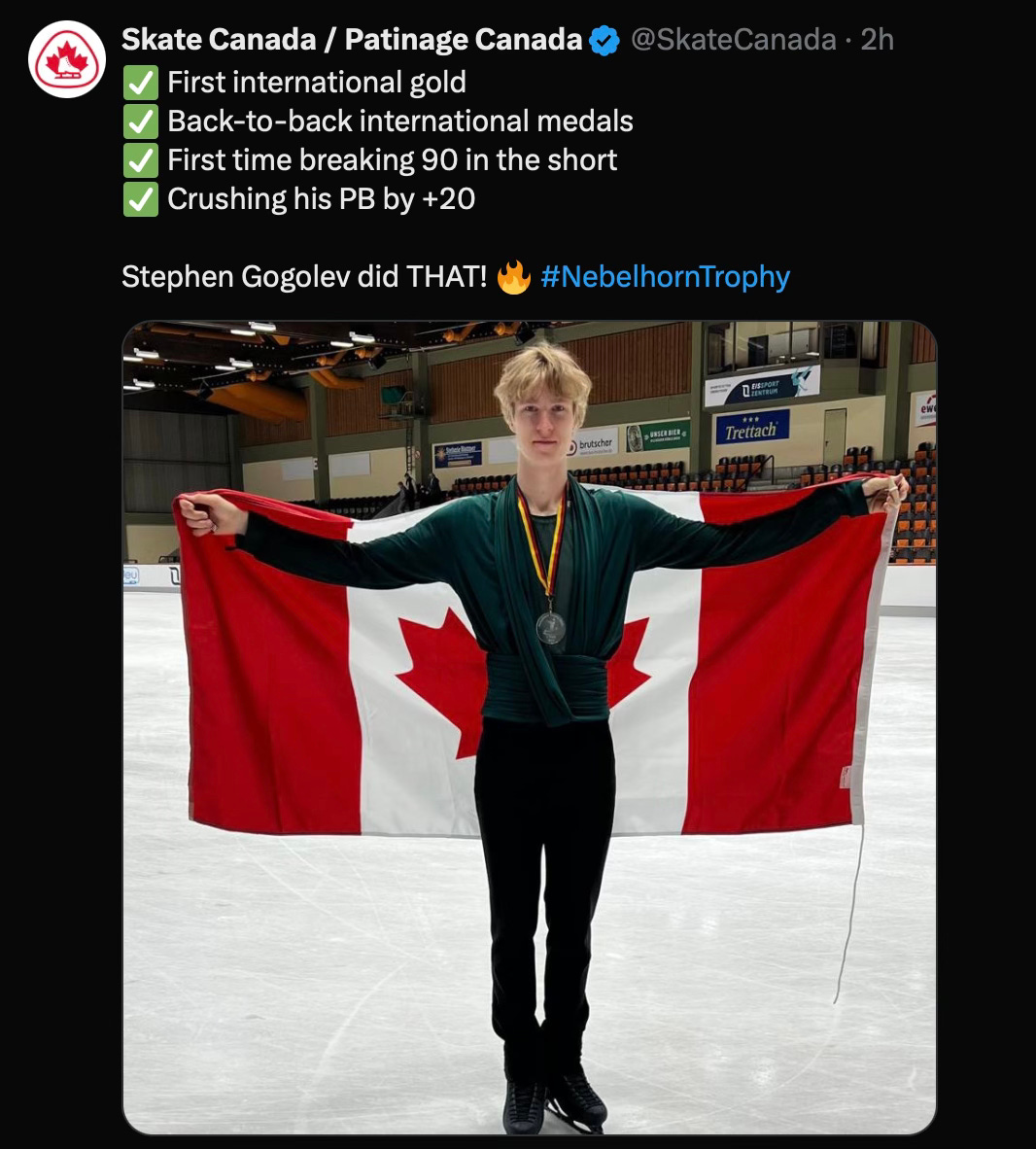Making time for a grand appearance
Uliana Shiryaeva was hoping to gain more international experience this season, and the Canadian teen will get a major opportunity to do that at Skate Canada International

It was the one of the simplest of figure skating goals put out there by a soft-spoken teenager and oh my, did she get her wish in the most tremendous of ways.
When Uliana Shiryaeva stood in front of a group of media at Skate Canada’s high performance camp last month in Mississauga, Ont., one of the queries was a basic one that we ask pretty much everyone: What are you goals this season? And the 18-year-old Shiryaeva’s response more or less matched the tone of the question.
“I say my goals are to show my programs and to skate clean and maybe get some international competition,” she said.
The latter wish was granted a week ago, when Skate Canada chose the Vancouver-based Shiryaeva to fill its third entry spot at Skate Canada International at the end of October in Saskatoon, Sask. It will mark the Grand Prix debut for the Moscow-born skater, who was selected in part because of her performances over the summer months, but also because of her standing on the alternates list for Grand Prix events.
Shiryaeva is the second-highest Canadian woman on that list, and the only skater from this country above her, Katherine Medland Spence, already has a Grand Prix assignment (NHK Trophy in Japan). She sits just in front of Sara-Maude Dupuis, who will also be at SCI along with three-time Canadian champion Maddie Schizas.
“She was actually the next in line after Katherine on the alternate list. We looked at the women that were on the alternate list and then we just looked at where people were at this summer, just based on readiness,” said Mike Slipchuk, Skate Canada’s high performance director. “Uliana had two good summer events — twice she posted scores over 170. She had the highest score in the summer over anyone that already has an assignment (174.22 at the Quebec summer championships in August in Pierrefonds).
“Uliana had a good consistent summer and and actually had a good season last year. As we said, her score was the highest on the alternate list next to those that have a Grand Prix assignment. It really isn’t anything more than that.”
Understand that this was a bit of a hot topic among skating observers over the summer, with names such as Kaiya Ruiter and the comebacking Gabrielle Daleman being heavily mentioned in that discussion. But it will be Shiryaeva, who made her senior international debut a year ago at Denis Ten Memorial in Kazakhstan, heading to the Canadian prairies for a new level of competition.
“She had a strong skate last year in Kazakhstan (Shiryaeva placed fourth and, more importantly, earned her technical minimums for the World Championships and, for this season, the Winter Olympics in Italy),” said Slipchuk. “At Canadians, she had a rough short, but had a better long (she finished ninth in Laval, Que.). We kind of looked at where people are at right now because we have to make the decision (on SCI) by the 15th of September.
“So it wasn’t like we had any luxury to wait until further events. We had to make a decision at that point. So we just went on summer events and how people skated at the high performance camp and we just made a decision from there.”
(an aside worth noting: Ruiter, the 2024 Canadian champion, just posted a 178.44 — her highest overall score internationally in three years — in placing fifth at Nebelhorn Trophy, a Challenger Series event held this week in Oberstdorf, Germany. That total included a personal best 64.46 in the short program. But as Slipchuk said, the decision on SCI had to be made just under two weeks ago).

The technical side of Shiryaeva’s skating is her current strength — she spoke in Mississauga about working on triple Axels and quads in practice — but it’s the program components mark that still needs work. But as Slipchuk pointed out, that’s pretty typical for skaters of her age.
“Her technical side is pretty strong. She shows good ability there and with her continued development, it’s now working on incorporating more of the second mark into her skating. And it’s coming,” he said. “Some skaters are strong technically and might be weaker on the PC side. Others are great at PCs and have to work on the technical. So it’s bridging that to get the PC marks moving up (closer) to where she’s been putting up technical scores.
“But that’s just the experience of getting out and, when opportunities come, skating well. So it’s a process. She definitely keeps improving and making strides in that direction. We hope Skate Canada is another good experience and it will be hard. It’s a tough event. So it’s a good litmus test to see where you fit in with all the top skaters.”
For those not familiar with her background, the Moscow-born Shiryaeva moved to Canada three years ago with her parents Olga, a teacher, and Vladimir, who works in information technology (IT). In Russia, her coaches were the husband and wife team of Julia Lavrenchuk and Alexei Vasilevski. When asked about her training mates there, and whether they might be familiar to the assembled media, she shook her head and responded “not really any famous people.”
It was on the recommendation of some Russian skaters that she wound up in the camp of Canadian coach Joanne McLeod at the Champs International Skating Centre of BC in Burnaby, a suburb of Vancouver (the family settled in nearby Coquitlam).
“We just contacted Joanne and said, we have this situation, can you watch me?” said Shiryaeva, who admitted leaving her homeland wasn’t easy on her. “It was my parents’ decision. It was hard for me to move, because it’s a different country. Everything’s different. I was worrying about my school. I was worrying about my skating, but everything went well.”
Shiryaeva arrived in Canada not knowing how to speak English, so communication was an immediate hurdle. But through the help of school teachers and friends, she was able to steadily learn how to speak and write the language.
“Just being at school … friends were teaching me a lot, how to talk (English). What are my mistakes? What am I doing wrong? So they were correcting me,” she said. “It was hard at first, but my teacher helped me at school, so they walked me through the school year, and then by second year, school was way easier. Now I’ve graduated (high school), and maybe I will be going to college.”
On the ice, however, things are moving along rather swimmingly. Skate Canada International will offer up a wider audience to see Shiryaeva’s programs. Her short program, crafted by McLeod, is performed to “Voila” by Barbara Pravi, a French singer/songwriter (Pravi used that piece of music to finish second in the 2021 Eurovision Song Contest).
Her long program, choreographed by Canadian Mark Pillay, is set to music from the “La Terre Vue du Ciel” soundtrack, by French composer Armand Amar. Shiryaeva called working with Pillay for the first time “a really fun experience.”
And now the big stage awaits at Skate Canada for her to perform them both.
History is made in Slovakia
While we’re on the topic of Canadian women … a moment of history we should note that occurred at Nepela Memorial, a Challenger Series event in Bratislava, Slovakia.
You may recall we spoke with Canada’s Sara-Maude Dupuis at the end of the summer about her quest to become the first woman from this country to land a triple Axel in competition. That moment happened earlier on Saturday, when Dupuis landed the 3-1/2 revolution jump in her free program (you can watch a video clip of it here, via Skate Canada).
“There’s no better feeling than landing a triple Axel as the first jump in the program. It wasn’t perfect, but I did it and it’s a big step forward!” she said afterward, per Skate Canada.
Though it will hardly create the same kind of buzz, the 20-year-old Dupuis also recorded personal bests in the short program (64.16) and for her overall total (178.77) in Oberstdorf. Just add all of that to what has already been a memorable 2025 for Dupuis, who earned her first-ever medal (a silver) at the Canadian national championships back in January in Laval, Que.

Bringing home the hardware
It’s been a rather banner year on the Junior Grand Prix circuit for Canadian skaters, who combined bring home at least one event from all five series events to date.
The medal total so far is 10 (three gold, four silver, three bronze), with the latest coming Friday in Baku, Azerbaijan. Ice dancers Summer Homick and Nicholas Buelow, the only Canadians at the competition, earned their second bronze medal on the circuit (the other coming at the beginning of September in Varese, Italy).
Homick and Buelow, who are both 18 and coached by a team led by Mitchell Islam at the Mariposa School of Skating in Barrie, Ont., recorded a personal best score of 58.78 in placing third in the rhythm dance. They were fifth in the free dance but hung onto the podium position by a mere 0.20 points.
While Skate Canada had high expectations for its top two junior-aged pair teams — Ava Kemp and Yohnatan Elizarov (who we profiled here last week), along with two-time Junior Grand Prix Final medallists Jazmine Desrochers and Kieran Thrasher — Slipchuk said he’s been impressed by the results others have produced.
“You know what, I just think it’s a good group that has developed over the years and they’re all kind of at the top of their games now,” he said. “With Grayson (Long), it was his first event in Latvia. It was a very tough field and he was a strong second there, as he should have been. I’m sure it was a real good confidence booster as he goes into his next event (Oct. 8-11 in Abu Dhabi, UAE, the final stop in the JGP).
“Ava and Yoni, they just had a year of injury (in 2024), so they missed the (Junior Grand Prix) season. And so after a good summer of training, they’ve definitely caught their strides. So we had looked at the two pair teams definitely tracking to get to the Final and we felt the same way about Layla (Veillon) and Alex (Brandys) also in dance. They just keep improving.
“And then we’ve had — I don’t want to say surprises — but I think the other medals that we’ve gotten, the four other medals in dance (Charlie Anderson and Cayden Dawson skated to a pair of silvers in Turkey and Thailand), it’s just good to see the teams going out, skating well and and being rewarded. So that’s a great sign for the NextGen program for sure.”
There will be opportunities for more medals next weekend at Solidarity Cup in Gdansk. Veillon and Brandys, who were golden in the series opener in Riga, Latvia, back in August, will target another top finish in ice dance. Desrochers and Thrasher, who brought home a silver medal from Bangkok earlier this month, hope to solidify their chances for a return to the Final, set for Dec. 4-7 in Nagoya, Japan.
The competition also offers first-year pairs team Julia Quattrocchi and Étienne Lacasse a chance to add to the bronze medal they picked up in Ankara.
In our interview last week with Kemp and Elizarov, the idea of perhaps skating in a senior international event this fall (they’re skating senior domestically this season) was broached (and someone speculated on a possible target). Slipchuk said plans are in the works to potentially make that happen later this fall.
“We haven’t finalized all that, but we’re definitely looking at some of the juniors that are doing well to get them out,” he said. “There’s some (potential) opportunities for them and we’re looking at possible opportunities for Grayson as well. The only ones that we won’t be able to do that (for) are the dancers because it’s two different rhythm dances from junior to senior.”
Golden in Germany
When Stephen Gogolev met with the media at Skate Canada’s high-performance camp at the end of August, there was one quote that stood out far above the rest: “This is the first time in quite a long time that I’m feeling healthy for an extended period of time. It helps me train more relaxed and confidently.”
If you know Gogolev’s history — his back in particular has been a perpetual issue over the past several years — you know that wasn't exactly a small declaration. It’s literally been THE issue for the 20-year-old from Toronto, who hardly lacks for talent. This is a skater who won the Junior Grand Prix Final back in December 2018 in Vancouver, just weeks before his 14th birthday, and nearly pulled off a Canadian senior title about a month later (he finished second after winning the short program in Saint John, N.B.).
To call Gogolev’s path since then long and winding … well, that would likely border on understatement territory in a major way. Take last season for example. Gogolev showed up in Halifax for Skate Canada International, turned in a solid short program … and that was the last we saw of him for the remainder of the season.
So yeah, good health makes a big difference for this guy in particular. And we’ve already seen evidence of what that can mean early in the current season. Back in August at Cranberry Cup International in the Boston area, Gogolev placed second in the short program en route to a bronze-medal finish behind event winner and Canadian teammate Roman Sadovsky.
Turns out Gogolev was just warming up. First, he turned in a personal best score of 90.19 in winning the short program at Nebelhorn Trophy in Oberstdorf, Germany. Then it was another PB (164.87) in topping the field in the free program, all of which produced a gold-medal winning total of 255.06 — his first victory at a Challenger Series event. The overall total is his highest since that JGP Final back in 2018.
It certainly has Gogolev on right track for Skate Canada International at the end of October in Saskatoon, Sask., where he’ll be joined by Canadian champion Sadovsky and Aleksa Rakic in the men’s event. Rakic placed 10th on Saturday at Nepela Memorial in Slovakia.
Sadovsky, meanwhile, finished second behind Gogolev in the free skate at Nebelhorn, which landed him in fifth place in the final standings. His overall total (233.39) was about 10 points below the score he produced to seize the gold at Cranberry Cup.
It’s almost show time
We’re about a week away from the beginning of Keegan Messing’s comeback season, with the two-time Canadian champion headed to Texas next week for a domestic event (Texas Trophy, in the Dallas suburb of Plano) that will determine what his next steps will be. He’ll need to hit or surpass a benchmark total score of 219 for Skate Canada to consider him for international competition later this fall.
Skate Canada officials got their first good look at Messing at their high-performance camp last month, and we asked Slipchuk to evaluate what he’s seen so far.
“He has work to do because he didn’t come back until June. So, it’s been a bit rushed for him because he had to get programs done and and get back into competition mode. But definitely, he did a lot of good stuff (at camp),” said Slipchuk. “Keegan is Keegan and he’s a veteran competitor, and he knows that thing. It takes some time just to get back into that competition mode, and the long program is the tough one just because they haven’t done anything like that in a few years.
“So we’re giving him time. He’s slated to go out and do an event in the States (next week), and we’ll see how he’s doing there, and then we’ll just go to next steps from there. But I’d be lying if I said it’s going to be an easy road because you’re a bit behind and so you’re trying to catch up. But if anyone can get themselves ready and catch up, it’s Keegan.”
If you’re looking at Challenger Series events he might be sent to — where he’d need to produce technical minimums to compete at the Milan-Cortina Olympics and the World Championships — think Warsaw Cup in late November, or Golden Spin of Zagreb in Croatia on the first weekend in December.
“You’re looking at the minimum 30 days out that you have to have everything submitted (to be entered), so it is tight. He’s kind of cutting it close,” said Slipchuk. “It’s not like you’re ready in August and you have September or October events. We’re looking at November now, just based on that we have other athletes to send out.
“Teams have been named (for October competitions) and athletes have been assigned. We only have so many spots for events. So it’s a bit of a puzzle, but we have a plan in place and we’ll just go along on how things are going.”
Around the boards
The podium roll continues for Canadian ice dancers Marie-Jade Lauriault and Romain Le Gac. The veteran duo made it 3-for-3 in terms of winning medals at international competitions this season by taking the bronze at Nebelhorn Trophy. Three weeks after striking gold at Kinoshita Group Cup in Japan, Lauriault and Le Gac moved up from fourth after the rhythm dance to climb onto the podium. Back in July, they were silver medal winners at the Lake Placid Ice Dance International competition. Fellow Canadians Lily Hensen and Nathan Lickers wound up sixth … In the pairs competition, reigning Canadian silver medallists Lia Pereira and Trennt Michaud pulled up to sixth in the final standings after an issue with a lift in their short program left them in 11th place … Canada’s Katherine Medland Spence placed 10th in the women’s event at Nebelhorn in her season debut … The Challenger Series moves to Kazakhstan next weekend for the Denis Ten Memorial. Canadian entries include three-time national champion Maddie Schizas (women); Matthew Newnham and John Kim (men), and Alicia Fabbri and Paul Ayer (ice dance) … The penultimate stop on the Junior Grand Prix series is also next weekend in Gdansk, Poland. The Canadian contingent headed there includes Edward Vasii (men); Hannah Quinn (women); Jazmine Desrochers/Kieran Thrasher, Julia Quattrocchi/Étienne Lacasse and Ava Cheung/Stephen Lee (pairs), and Layla Veillon and Alexander Brandys (ice dance).


